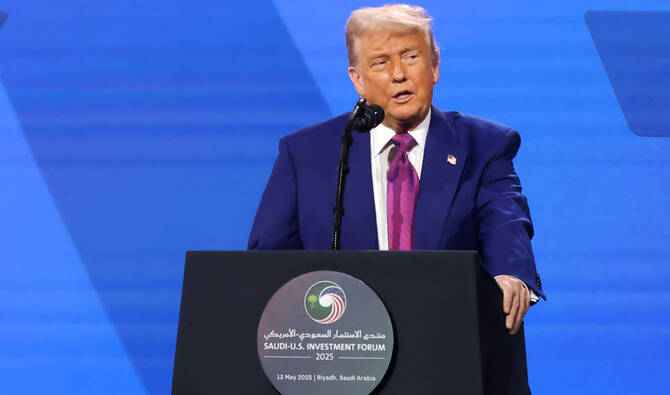
- ARAB NEWS
- 20 Aug 2025

The words “historic” and “groundbreaking” are probably used far too often by pundits. Sometimes, they are awfully misplaced, such as when used in contexts like that of former US President Barack Obama’s Cairo speech of 2009.
However, there is no doubt that President Donald Trump’s Riyadh speech of May 13, 2025, will go down in the history books as a turning point — not just for Saudi-US relations, but for the whole region as well.
In fact, Trump’s Riyadh address brought so much energy that one could almost say he got a rockstar reception. His words resonated deeply, marking a significant juncture in US-Arab relations.
There were three main points that made the speech historic: Trump’s statesman’s overture; his acknowledgment of previous US mistakes; and his celebration of regional triumphs, particularly in Saudi Arabia.
Firstly, Trump extended an olive branch to Iran, signaling a potential shift in the region’s dynamics. He addressed the Syrian crisis by lifting US sanctions on Damascus and expressed a commitment to improving conditions for Palestinians. Furthermore, he pledged support for rebuilding Lebanon, showcasing a comprehensive approach to regional stability. He also thanked Saudi Arabia for its efforts in mediating between Russia and Ukraine.
Secondly, in a candid acknowledgment, Trump addressed the missteps of past US foreign policy. He criticized the interventionist strategies of both neoconservatives such as George W. Bush and liberal administrations such as Obama’s for burdening the region with added challenges.
From Bush’s 2003 invasion of Iraq, which Saudi Arabia strongly warned against, to the disastrous results of the so-called Arab Spring, which was passionately encouraged by Obama’s “mis-adviser” Ben Rhodes and Secretary of State Hillary Clinton, he correctly identified the errors made by America in its policy toward the region this century.
In the run-up to the US invasion of Iraq, we recall how Saudi Foreign Minister Prince Saud Al-Faisal had raised serious concerns. “What’s going to happen to them (Iraqi soldiers and officials), especially since the army was disbanded and the government fired? And who’s going to rule Iraq if you have that?” he asked. “Saddam Hussein had perhaps 2 million people controlling Iraq. The US and its allies have close to 150,000. How do you make that work?”
Trump’s address will go down in the history books as a turning point — not just for Saudi-US relations, but for the whole region as well.
Faisal J. Abbas | Editor-in-Chief
The debate at the time was not over whether or not Saddam’s regime was evil, but whether or not the US had a plan for the day after — as it turned out, it didn’t, yet the invasion went ahead anyway.
“In the end, the so-called nation-builders wrecked far more nations than they built and the interventionists were intervening in complex societies that they did not even understand themselves. They told you how to do it, but they had no idea how to do it themselves,” Trump said.
“Peace, prosperity and progress ultimately came not from a radical rejection of your heritage, but rather from embracing your national traditions and embracing that same heritage that you love so dearly.”
Trump went on to set the stage for a profitable new era working alongside the forward-looking countries of the Middle East.
“Before our eyes,” he said, “a new generation of leaders is transcending the ancient conflicts and tired divisions of the past and forging a future where the Middle East is defined by commerce, not chaos. Where it exports technology, not terrorism. Where people of different nations, religions and creeds are building cities together, not bombing each other out of existence.
“And it is crucial for the wider world to note this great transformation has not come from Western interventionists, flying people in beautiful planes, giving you lectures on how to live and how to govern your own affairs. No. The gleaming marvels of Riyadh and Abu Dhabi were not created by the so-called nation-builders, neocons or liberal nonprofits, like those who spent trillions and trillions of dollars failing to develop Kabul and Baghdad, so many other cities.”
Thirdly, Trump lauded the achievements of the Gulf Cooperation Council, with particular emphasis on Saudi Arabia, the UAE and Qatar. He reaffirmed American support for these states’ ongoing transformations. The Kingdom, in particular, has undergone a dramatic transition in the nine years since Crown Prince Mohammed bin Salman unveiled the Vision 2030 plan that is revolutionizing all aspects of the Saudi economy and society.
“The birth of a modern Middle East has been brought by the people of the region themselves; the people that are right here, the people that have lived here all their lives, developing your own sovereign countries, pursuing your own unique visions and charting your own destinies, in your own way,” Trump said. “It is really incredible what you have done.”
Additionally, he renewed the 80-year US commitment to defending Saudi Arabia. However, he clearly indicated that the relationship goes far beyond security and that the US is a firm believer in the Kingdom’s leadership.
“The transformation that has occurred under the leadership of King Salman and Crown Prince Mohammed has been truly extraordinary,” he said. “I’ve never seen anything at that scale happen before.”
Of the crown prince, he added, “I really believe we like each other a lot,” telling him: “You achieved a modern miracle the Arabian way.”